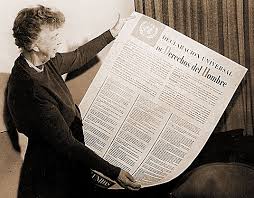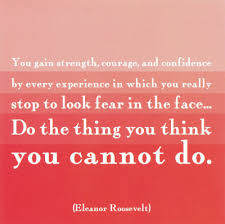.

| You gain strength, courage, and confidence by every experience in which you really stop to look fear in the face… Do the thing you think you cannot do. Elenor Roosevelt |

.
Why we talk about Human Rights, and what we mean by Human Rights....
Our attempts to protect ourselves from abuse by alleged racketeering judiciary through U.S. Courts and the Civil Rights in the Amendments were a disappointment and a disgrace!
Therefore, it became irrelevant to talk about Civil Rights in the U.S. at this time...
However, luckily, largely through efforts of the U.S. the Universal Declaration of Human Rights was created, which eventually became part of ratified International Law... Certain courts around the world are more active than others in this area.
We would seek probably first to have a group appear in one of these courts, and file are testimonies regarding the conditions of the U.S. Justice System today, and the disregard for Human Rights by those who were charged with upholding them.
Beyond that - we would explore ways to restore our rights at home through litigation in such courts. Surely, none of the allegedly racketeering judges would like to be under conditions where their travel would be restricted, because of concern that they maybe stopped for Human Rights abuses... I am describing just one of the ways that such courts may have powers and influence...
What surprised me the first time Iread the Universal Declaration, was the large number of articles that are devoted to prescribing the various aspects of integrity in the justice system... It obviously was seen as a critical part of the system by the drafters of the Declaration.
Since I got involved in this area only through necessity and only a few years ago, I am missing the perspective... The question on which I am seeking any comments, is what was the general change in Human Rights compliance in the U.S. in California, in Los Angeles County. Particularly, if anybody has hard data of any kind...
There were some comments on the subjects in the Blue Ribbon Review Panel Report (2006), which I consider mandatory reading for anybody who lives in LA or California, or for that matter in the U.S. It took me a couple f readings before I figured out what it was all about... I remember clearly, it was the second time I was reading it... and I hit that line about the justice system that harbors a "subcult of criminality in its ranks". I paused for a minute... digested it, and after that, it was easy and simple... If there is anything I would fault the report for - is the fact that they described it as "subcult" It is and it surely was by 2006 the dominant cult of the justice system. In 2007, in he West District of the Superior Court of Los Angeles County, 9 out of 10 judges were eager to participate in alleged racketeering. There was only one judge who recused without agreeing to touch the file-1) Joseph Biderman in West LA ...
.
.
___________________________________________
The Universal Declaration of Human Rights
___________________________________________
.
On 10 December 1948, the General Assembly of the United Nations adopted and
proclaimed the Universal Declaration of Human Rights, the full text of which appears in the
following pages. Following this historic act, the Assembly called upon all Member
countries to publicize the text of the Declaration and "to cause it to be disseminated,
displayed, read and expounded principally in schools and other educational institutions,
without distinction based on the political status of countries or territories."
PREAMBLE
Whereas recognition of the inherent dignity and of the equal and inalienable rights of all
members of the human family is the foundation of freedom, justice and peace in the world,
Whereas disregard and contempt for human rights have resulted in barbarous acts which have
outraged the conscience of mankind, and the advent of a world in which human beings shall
enjoy freedom of speech and belief and freedom from fear and want has been proclaimed as the
highest aspiration of the common people,
Whereas it is essential, if man is not to be compelled to have recourse, as a last resort, to
rebellion against tyranny and oppression, that human rights should be protected by the rule of
law,
Whereas it is essential to promote the development of friendly relations between nations,
Whereas the peoples of the United Nations have in the Charter reaffirmed their faith in
fundamental human rights, in the dignity and worth of the human person and in the equal rights
of men and women and have determined to promote social progress and better standards of life
in larger freedom,
Whereas Member States have pledged themselves to achieve, in co-operation with the United
Nations, the promotion of universal respect for and observance of human rights and fundamental
freedoms,
Whereas a common understanding of these rights and freedoms is of the greatest importance
for the full realization of this pledge,
Now, Therefore THE GENERAL ASSEMBLY proclaims THIS UNIVERSAL DECLARATION
OF HUMAN RIGHTS as a common standard of achievement for all peoples and all nations, to
the end that every individual and every organ of society, keeping this Declaration constantly in
mind, shall strive by teaching and education to promote respect for these rights and freedoms
and by progressive measures, national and international, to secure their universal and effective
recognition and observance, both among the peoples of Member States themselves and among
the peoples of territories under their jurisdiction.
.
Article 1.
All human beings are born free and equal in dignity and rights.They are endowed with reason and conscience and should act towards one another in a spirit of brotherhood.
Article 2.
Everyone is entitled to all the rights and freedoms set forth in this Declaration, without distinction of any kind, such as race, colour, sex, language, religion, political or other opinion, national or social origin, property, birth or other status. Furthermore, no distinction shall be made on the basis of the political, jurisdictional or international status of the country or territory to which a person belongs, whether it be independent, trust, non-self-governing or under any other limitation of sovereignty.
Article 3.
Everyone has the right to life, liberty and security of person.
Article 4.
No one shall be held in slavery or servitude; slavery and the slave trade shall be prohibited in all their forms.
Article 5.
No one shall be subjected to torture or to cruel, inhuman or degrading treatment or punishment.
Article 6.
Everyone has the right to recognition everywhere as a person before the law.
Article 7.
All are equal before the law and are entitled without any discrimination to equal protection of the law. All are entitled to equal protection against any discrimination in violation of this Declaration and against any incitement to such discrimination.
Article 8.
Everyone has the right to an effective remedy by the competent national tribunals for acts violating the fundamental rights granted him by the constitution or by law.
Article 9.
No one shall be subjected to arbitrary arrest, detention or exile.
Article 10.
Everyone is entitled in full equality to a fair and public hearing by an independent and
impartial tribunal, in the determination of his rights and obligations and of any criminal
charge against him.
Article 11.
(1) Everyone charged with a penal offence has the right to be presumed innocent until
proved guilty according to law in a public trial at which he has had all the guarantees
necessary for his defence.
(2) No one shall be held guilty of any penal offence on account of any act or omission
which did not constitute a penal offence, under national or international law, at the time
when it was committed. Nor shall a heavier penalty be imposed than the one that was
applicable at the time the penal offence was committed.
Article 12.
No one shall be subjected to arbitrary interference with his privacy, family, home or
correspondence, nor to attacks upon his honour and reputation. Everyone has the right
to the protection of the law against such interference or attacks.
Article 13.
(1) Everyone has the right to freedom of movement and residence within the borders of
each state.
(2) Everyone has the right to leave any country, including his own, and to return to his
country.
(incomplete copy)
No comments:
Post a Comment